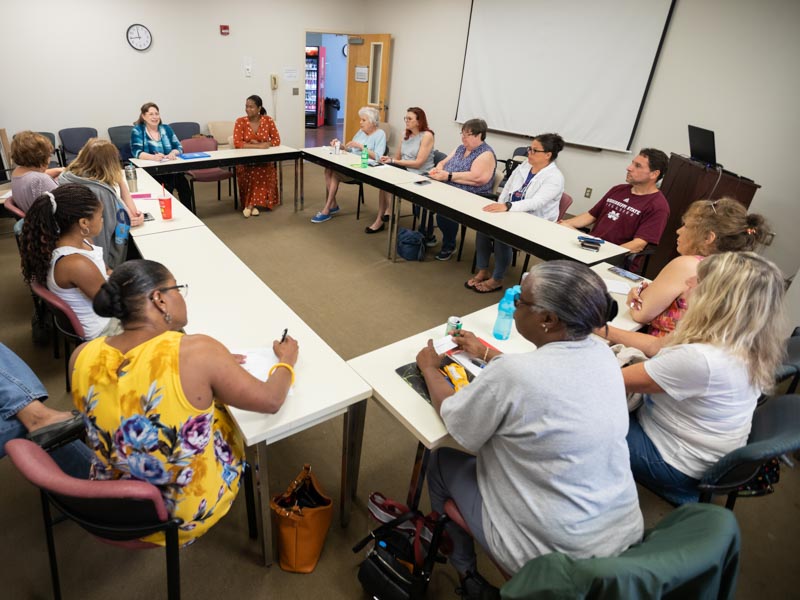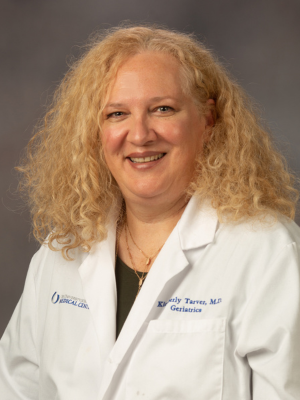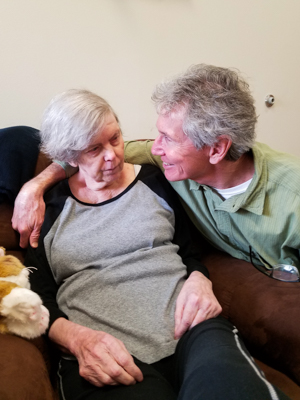Self-care crucial while caring for loved ones with dementia

Alzheimer’s and dementia are often described as isolating and unpredictable diseases.
They isolate not only those with the disease but also their caregivers, and the disease looks different for everyone. Cognitive declines are impossible to forecast, and symptoms vary widely. Some people live with dementia for more than a decade, while others live less than a year.
Add to that a global pandemic that requires social distancing and other extreme measures, and caregivers today are facing a whole different set of challenges.
That’s why Dr. Kim Tarver, a geriatrician at the University of Mississippi Medical Center and director of The MIND Center’s clinical services, took to Facebook on Wednesday to livestream a video of her sharing tips and comforting words for caregivers who are members of the MIND Center Caregiver Group.

“You’re not forgotten, and we value and hold you up as important, both to your families and those of us who care for patients with dementia,” she said.
Mandy Strong-White of Jackson is one of an estimated 207,000 people in Mississippi who are taking care of a loved one with the disease. For Strong-White, it’s her sister, who is currently in an assisted living facility.
Before COVID-19, Strong-White’s daily routine included one or two short drives to visit her sister. She took care of her hygiene needs and worked with the staff to make sure she never went without anything.
Her sister took a sharp turn for the worse in the months leading up to the pandemic, becoming less able to perform simple daily tasks of living. Strong-White asked for more assistance from the staff at the facility and began looking into skilled nursing facilities, which offer a higher level of care. In the meantime, though, she ensured her sister was checked on by staff at least every two hours.
In addition, exactly one day before the facility stopped allowing visitors because of COVID-19 transmission, everything was finalized for hospice to begin working with her sister, which Strong-White said has been a godsend. A nursing assistant with hospice is checking on her sister three to four times a week while an RN sees her once or twice a week.
“I am so blessed for that. So many people don’t have anyone that can go (visit their loved one) and provide that one-on-one touch,” she said.
Since the quarantine, she’s also still able to bring snacks and other goodies her sister likes to the facility.
But she still gets anxious about the many unknowns – and about not being there in person.
She wrestles with whether to call her sister, realizing a phone call might upset her because she doesn’t understand why she can’t visit.
“Is she sitting there suffering? Is she going to remember me when I do get to see her?”
These are the questions that sometimes pop up. But Strong-White said as she watched Tarver’s video message, she was comforted by it.
“She reassured me that the best that I can do is the best that I can do. She erased the doubts of whether or not I’ve done the right thing,” she said. “She pointed out there is no textbook way to do this.”

Jim Lee of Ridgeland is in a similar situation to Strong-White. Lee’s wife has struggled with dementia for more than 10 years and currently lives in a memory care facility.
While he is still able to visit his wife, her sisters and other family members in the area are not.
Tarver’s advice to make a list of things one can control and a list of things that are out of one’s control resonated with him.
“That’s one of the key things right there. I’m focusing on my wife’s care and taking proper precautions for the virus,” he said.
While Tarver also offered practical solutions to keeping the virus at bay – such as social distancing, frequent and proper handwashing, disinfecting surfaces – she drove home the importance of caregivers taking care of themselves emotionally.
“When you’re a caregiver, how you’re doing emotionally has as much to do with how well you can care for your loved one as anything else,” she said.
Tarver encouraged caregivers to monitor how they’re doing and watch for signs of depression, which can manifest as overly negative or suicidal thoughts or decreased enjoyment of activities that used to be enjoyable.
Developing a routine and keeping a calm environment, limiting news consumption and minimizing noise, is helpful not only for the caregiver but for the person with dementia, as they often become agitated by changes in routine.
She also encouraged getting outside and taking short walks with your loved one if he or she is healthy enough to do so, pointing out exercise and sunshine are one of the quickest and most effective antidotes to depression. If the family member or loved one can no longer walk, going for a drive with the windows down is another way to get fresh air.
She suggests if someone finds themselves in a panic, take time to slow down and get help.
“Reach out and connect with someone, and talk openly about your fears,” she said.
Other tips from Tarver to keep caregivers and loved ones safe during COVID-19:
- Wash your hands frequently according to guidelines from the Center for Disease Control (CDC). That includes washing for at least 20 seconds.
- Observe social distancing.
- Wipe down surfaces with a disinfectant, allowing the disinfectant to dry naturally.
- Make a contingency plan for who will take care of your loved one if you get ill.
- Ask the physician to provide your loved one’s prescriptions for longer than normal to minimize trips to the pharmacy.
- Have groceries delivered if possible.
- Watch for sudden increased confusion in your loved one, even without a fever. This is often the first sign of illness.
- Make sure family members are on the same page about the loved one’s end-of-life wishes.
For more information about The MIND Center’s caregiver support services, email mindclinic@umc.edu or call 601-496-6463, option 2.


